Katie, science teacher and keen camper, shares her best teaching hacks and a chemist who inspires her
-
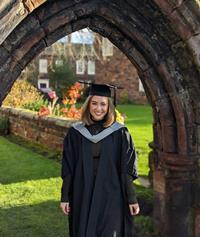
After growing up in Lancashire, completing a master’s in biochemistry in York and a PGCE in chemistry at the University of Cumbria, Katie relocated to St Albans in Hertfordshire, where she teaches all science disciplines and is head of houses at Beaumont School. When she’s not in the lab or organising the Great Beaumont Bake Off, you can find her choreographing a dance show – or heading north to camp in the Lake District. She shares some of her favourite moments from teaching, a piece of advice that has stuck with her and somebody that inspires her.
What do you wear to school? Do you have a favourite outfit for teaching?
This really depends on the weather! You might see me wearing a colourful shirt and trousers, classic teacher dress or a chunky knit cardigan. However, you will most likely find me wearing my trusty Dr Martens.
What’s your favourite teaching hack you’d like to share?
I absolutely love using my visualiser. For KS3, I also have my own exercise book where I annotate, model my working and narrate my thought process to students when introducing new concepts or completing example questions. I find this has supported students to become more independent learners.
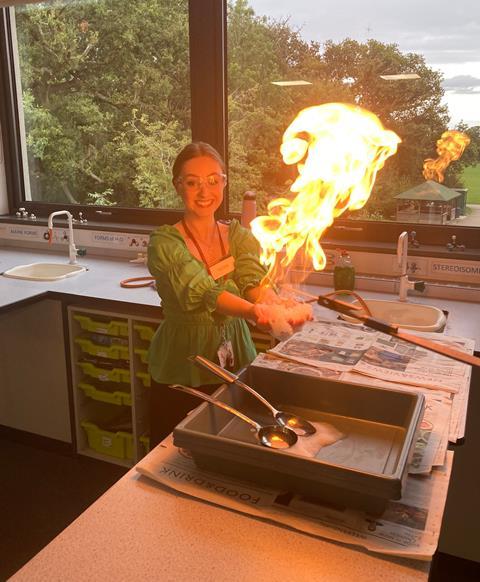
Do you have a teaching resource you keep coming back to?
I am a big fan and subscriber of Chemix, a website where you can create your own visual instructions for practical investigations. The visuals I have created using Chemix have proved invaluable in supporting students to access practical procedures, reducing cognitive load and allowing them to focus on their results and the chemistry involved.
I am a big fan and subscriber of Chemix (chemix.org), where you can create your own visual instructions for practical investigations. The visuals I have created using Chemix have proved invaluable in supporting students to access practical procedures, reducing cognitive load and allowing them to focus on their results and the chemistry involved.
Are you involved in any extracurricular activities at school?
In my role as head of houses, I coordinate various house point-scoring events across the year, such as our famous annual Great Beaumont Bake Off.
I support my colleague in the running of our year 7 science club. Each week we welcome a (sometimes massive) group of eager students to take part in various exciting science experiments. A favourite week of mine was when the students dissected owl pellets to try and decipher what the owls had eaten.
I also co-lead our annual dance show. Last year, I supported our fantastic dancers in their choreography and performance as well as choreographing a tap piece (my personal favourite dance style) for a lovely group of students. I’d be very rich if I received a pound for every time I shouted ‘smile!’ during rehearsals. Watching our wonderful students perform across two nights in our Barbie-themed show was a really proud moment for me.
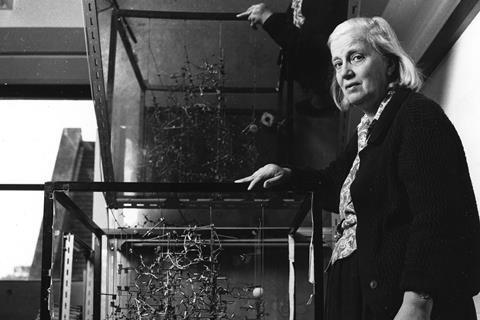
What’s on your bookshelf?
Reading is something I’m trying to make more time for. I love a fiction book and you’ll generally find me reading either a classic romance or a sci-fi/dystopian novel.
Imagine you can only share one piece of advice with your fellow teachers, what would you say?
A piece of advice I was given during my training year that has really stuck with me as a confessed perfectionist is ‘good is good enough’. Of course, you want to work hard to support your students and your own professional development, but it’s important to take time for yourself and not work yourself into the ground. You’ll be a better teacher if you are rested and happy.
Get involved
Want to suggest a question? Want to be the next teacher, technician or trainer in this series? Email education@rsc.org today.
How do you relax?
Exercise really helps me relax; I go to a barre class every week and find time to go out walking. I also really love going camping with my boyfriend, the Lake District is a particular favourite of ours.
Who’s your hero?
I am truly inspired by all the incredible women in STEM who faced adversity in a male-dominated society and industry but continued to pave the way for future generations of women.
A particularly inspirational example is Dorothy Hodgkin, an exceptional chemist. Hodgkin fought to enrol at a state secondary school where chemistry was only accessible to boys and ultimately received the Nobel prize for chemistry in 1964 for her determination of the structures of important biochemical substances using x-ray techniques. Hodgkin is still the only British woman to be awarded a Nobel prize for science.
A particularly inspirational example is Dorothy Hodgkin (rsc.li/3TrFud1), an exceptional chemist. Hodgkin fought to enrol at a state secondary school where chemistry was only accessible to boys and ultimately received the Nobel prize for chemistry in 1964 for her determination of the structures of important biochemical substances using x-ray techniques. Hodgkin is still the only British woman to be awarded a Nobel prize for science.
I wish the curriculum had scope for us to educate students more about the inspirational people who shaped the world as we know it.
Teachers ask teachers
In the first Meet the … article, we asked Harry Lord to suggest a question for the next interviewee. He asked:
Why did you get into teaching in the first place?
I loved teaching for the University of York’s Dance Society during my time there. It was something I enjoyed and was good at. During my degree, I also took a module on science education, where I got to work with students from local schools, bringing them into the university to use exciting pieces of equipment and engage them in science. This inspired me to choose a career in teaching to be able to work with young people and spread my love for science to the next generation.
We asked Katie for a question for the next interviewee and she suggested:
Do you have a favourite lesson to teach? Why?





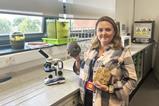
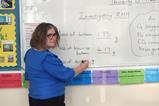
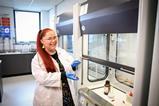



No comments yet